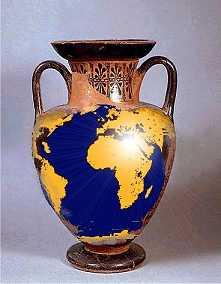|
 |
|
 |
Part II (section 1-2) | Part III (section 3-5)
Abstract
Much of the identity discourse on Africa today, including that focussing on Black Athena, is of an aggregate and extremely abstract nature. A century of specialised ethnographic and historical research on Africa has allowed us to proceed to much greater precision, dividing up cultural heritages on the African continent into component strands and linking each of these strands specifically to global cultural history. What we lose in the process is an, ideologically attractive, blanket concept of mystical Africanness — focus of so much positive and negative bias. What we hope to gain is a more realistic view of the continental and intercontinental connections of the varieties of cultural achievements, borrowings and transformations. What does an analysis of the type advocated suggest as to Africa’s place in long-term global cultural history? Is Africa the unique and universal matrix, the primal origin of civilisation, as claimed in extremist appropriations of Black Athena? Is it, on the contrary, the exclusively receptive, passive end station of imported culture produced by the genius of other continents, as in the Eurocentric myth? Do more subtle models of exchange and transformation present themselves? In order to explore these questions, I will offer two — extremely truncated — case studies, tracing the trajectory of two famous genres of African cultural production widely attested across the continent since the sixteenth century CE, and featuring in many constructions of Africa as a continental cultural unit: geomantic divination (known in various parts of the African continent as Ifa, Sikidy, Hakata, etc.), and the mankala board-game (based on the repeated redistribution on tokens over a number of holes, and known in various parts of the African continent as nsolo, wari, bao, etc.). The complex analysis of these cultural phenomena leads us to formulate three tasks for future research. (1) The kind of anti-racialist anti-Eurocentric critique of scholarship which Black Athena I has so brilliantly and largely successfully undertaken for classics as a discipline, could and should also be undertaken for African Studies and anthropology. Such a task would have to be completed before even we can set out to perform task (2): tracing the concrete implications of the Black Athena thesis further on to ancient African cultures as major sources of ancient Egyptian culture. Only after these two tasks have been completed can we come to terms with task (3): A fair assessment of the Afrocentrist claims — extremist as well as moderate and plausible ones — which Black Athena has reinforced, much to the dismay of many of its critics.
After this general abstract page, the paper consists of:
Part II (click
to open)
1. Introduction
2. Two case studies: geomantic divination and mankala board-games
in Africa and elsewhere
Part III (click
to open)
3. Patterns of intercontinental cultural interaction
4. ‘Africa’ not a viable unit of scientific analysis
but a welcome concept in identity formation
5. Conclusion: Three tasks ahead of us
[1]Earlier versions of this paper were presented at: the International Colloquium ‘Board-games in Academia’, Leiden University, 9-13 April, 1995; at a seminar I gave at the Institute for the Study of Religion and Society, Municipal University of Amsterdam, 12 May, 1995; at the conference on ‘Black Athena: Africa’s contribution to global systems of knowledge’, African Studies Centre, Leiden, The Netherlands, 28 June, 1996; and at the Africa Research Centre, Catholic University Louvain, 8 November, 1996. I am indebted to the participants in the discussion on these occasions. I also register my indebtedness to: Alex de Voogd for introducing me to the literature on mankala; to Irving Finkel for invaluable suggestions and encouragement; to Martin Bernal, Josine Blok, Pieter Boele van Hensbroek, Filip de Boeck, Renaat Devisch, and Arno Egberts (alphabetical order) for useful comments towards the present paper; and to the Netherlands Institute for Advanced Study in the Humanities and Social Sciences (NIAS), where the present argument was largely conceived and written while I was a member of the theme group on Magic and religion in the Ancient Near East (1994-95). For further theoretical discussion, cf. van Binsbergen, W.M.J., 1996, ‘Time, space and history in African divination and board-games’, in: Tiemersma, D., & Oosterling, H.A.F., eds., Time and temporality in intercultural perspective: Studies presented to Heinz Kimmerle, Amsterdam: Rodopi, pp. 105-125.
Part II (section 1-2) | Part III (section 3-5)
| page last modified: 20-04-13 12:34:48 |  |
|||
 |